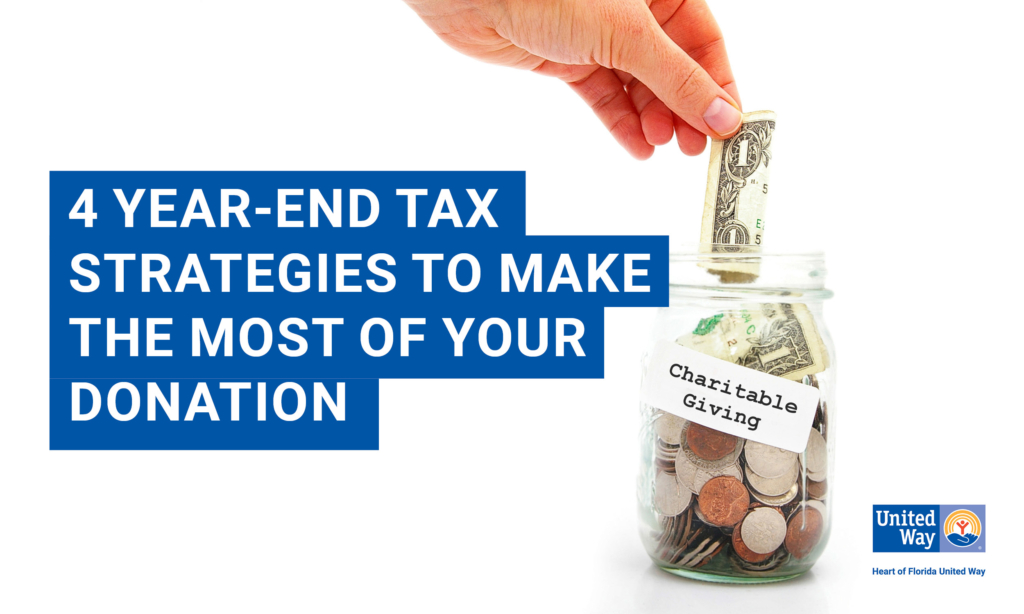As the end of 2021 quickly approaches, you may be considering your tax liabilities for the past year. You might be asking “how do I effectively itemize my deductions?”, or “how should I manage my gains on stocks, securities, and other investments?”
Here is a quick guide to help make the decisions a little easier.
CASH IS KING!
Did you know that 100% of your donation could be tax-deductible? Or did you know that in 2021, you could deduct 100% of your adjusted gross income from your taxes? Here are three ways cash is king when you make year-end contributions to public charities:
- Taxpayers who do not itemize their charitable deductions can claim a tax benefit up to $300 (individual) or $600 (married couple filing jointly) for cash gifts made to public charities in 2021.
- Taxpayers who itemize their charitable deductions may deduct cash contributions to public charities up to 100% of their adjusted gross income in 2021, increasing the previous 60% limit.
- Corporate taxpayers may deduct up to 25% of their taxable income in 2021, an increase from the typical 10% limit.
GIVE APPRECIATED NON-CASH ASSETS INSTEAD OF OR IN ADDITION TO CASH.
One of the most powerful tax-smart strategies is donating appreciated non-cash assets. If you are required to or are considering selling non-cash assets that have appreciated, your profit could be subject to a capital gains tax. However, donating these assets before selling them could increase your tax saving and potentially benefit Heart of Florida United Way up to 20% of the value of the donation.
LEVERAGE A CHARITABLE DEDUCTION STRATEGY
Charitable giving is not always the same each year. For example, as employment changes, assets appreciate, and investments play out, some donors may find that the total of their itemized deductions for a year is slightly below the standard deduction level.
To make a more significant impact this year, you could combine your 2021 and 2022 charitable giving on your 2021 tax returns and take the Standard Deduction on your 2022 taxes. This strategy could produce a larger two-year deduction than two separate years of itemized deductions, depending on income level, tax filing status, and giving amounts each year. But, make sure you ask your tax professional for more information.
GIVE MORE BY DONATING RETIREMENT ASSETS
Some donors who are retired, near retirement, or reviewing estate plans might consider using these three tax-smart tips to help maximize their charitable impact this year as part of their overall legacy planning.
- Make Qualified Charitable Distributions (QCD) of Individual Retirement Account (IRA) assets. Donors aged 70 ½ or older can transfer up to $100,000.00 annually from IRA accounts to the Heart of Florida United Way without having to recognize the distribution as income.
- Use a charitable deduction to help offset the tax liability of a retirement account withdrawal. Individuals over age 59½ may use this strategy to itemize deductions for 2021. A withdrawal offers the additional benefits of potentially reducing a donor’s taxable estate and limiting tax liability for account beneficiaries.
- Convert retirement accounts to Roth IRAs. Individuals who itemize deductions and have tax-deferred retirement accounts, such as traditional IRAs, can use charitable deductions to help offset the tax liability on the amount converted to a Roth IRA. The Roth IRA offers tax-free growth, potentially tax-free withdrawals, no annual required minimum distribution, and the elimination of tax liability for beneficiaries (depending on the timing).
We hope these year-end giving tips help you make an informed decision when planning your strategies. However, we strongly encourage readers to seek out the advice of a trusted tax professional for more information before they take any action. Charitable giving is a personal decision. Whether you support Heart of Florida United Way and the thousands of ALICE families throughout Central Florida or another fantastic charity in our community, we want to say thank you and LIVE UNITED!
*The information in this blog post is not to be construed in any manner as tax advice. Donors should contact their tax advisors or professionals before taking any action.









